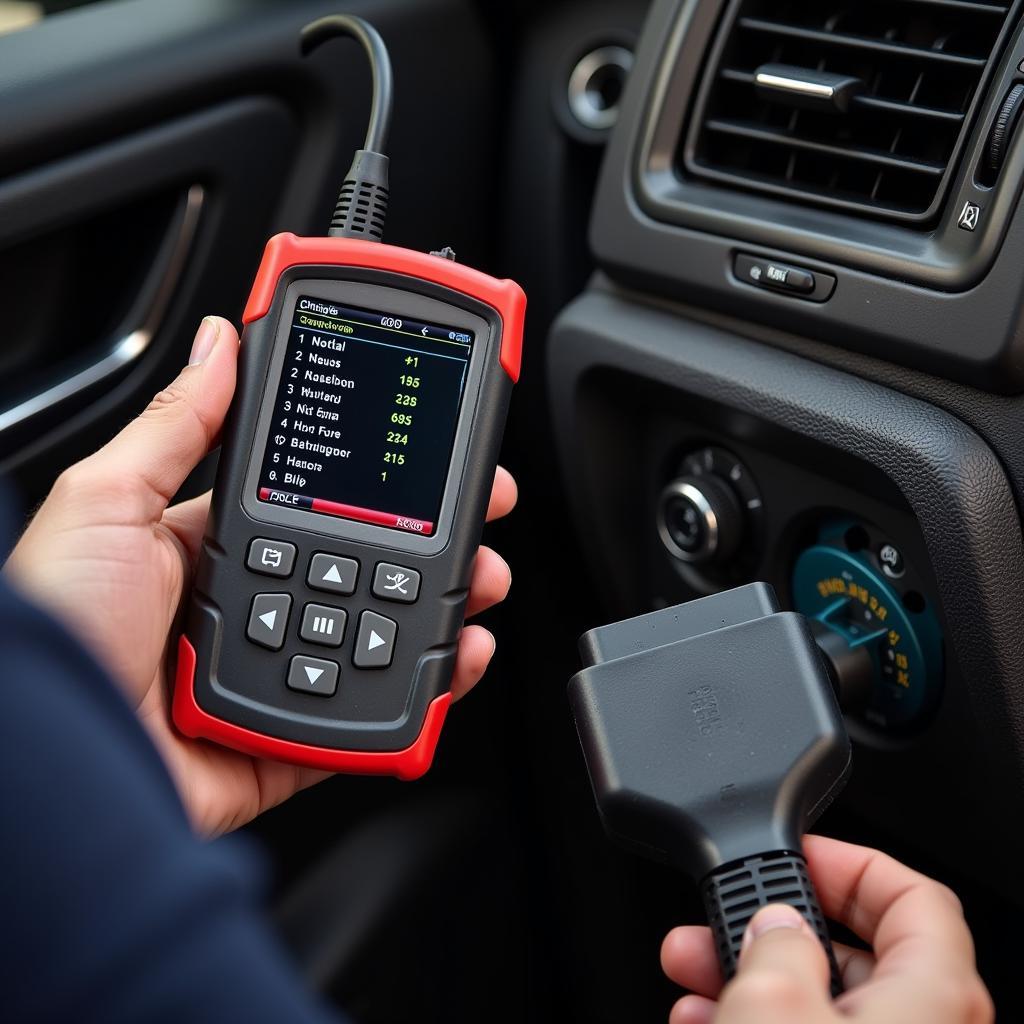A blown fuse can be a real headache, especially if you’re not sure how to identify the culprit. Luckily, you can quickly pinpoint the problem and get back on the road with the right car diagnostic tool. This article will explore how these tools can save you time and frustration by helping you quickly identify a failed fuse.
 Car Diagnostic Tool Identifying Blown Fuse
Car Diagnostic Tool Identifying Blown Fuse
Understanding Fuses and Their Role
Before we dive into the tools, let’s quickly review what fuses do. Fuses are your car’s safety net for its electrical system. They are small, inexpensive components designed to sacrifice themselves to protect more expensive parts from damage due to electrical overloads. When a circuit experiences a surge of current exceeding the fuse’s amperage rating, the fuse “blows” – effectively breaking the circuit and preventing the current from reaching sensitive components.
Signs of a Blown Fuse
A blown fuse often manifests as a complete loss of functionality in a specific system or component in your car. For instance, your headlights might not turn on, the radio might go silent, or the power windows might stop working. These are all telltale signs that a fuse related to that system may have blown.
Traditional Methods for Identifying Blown Fuses
Traditionally, identifying a blown fuse involved locating your car’s fuse box (often found in the engine bay or under the dashboard), consulting the owner’s manual to find the correct fuse for the malfunctioning system, and visually inspecting each fuse for a break in the filament. This method can be time-consuming and inconvenient, especially if you’re unsure which fuse controls the affected system.
Modern Solutions: Enter the Car Diagnostic Tool
Fortunately, technology has come to the rescue with advanced car diagnostic tools. These handy devices plug into your car’s OBD-II port (usually located under the steering wheel) and communicate with your vehicle’s computer system.
Here’s how they can help identify a failed fuse:
- Read Fault Codes: Most modern cars will log a fault code in the vehicle’s computer system when a fuse blows. A good car diagnostic tool can read these codes and provide a description of the problem, often pointing you directly to the affected circuit and fuse.
- Live Data Monitoring: Some advanced diagnostic tools offer live data monitoring of various electrical systems. This feature allows you to observe the current flow and voltage readings in real-time, helping you identify any irregularities that could indicate a blown fuse.
Choosing the Right Car Diagnostic Tool
The market offers a wide array of car diagnostic tools, from basic code readers to professional-grade scanners. For effectively identifying blown fuses, consider a tool that:
- Reads and Clears Fault Codes: This is a fundamental feature for any diagnostic tool.
- Provides Code Definitions: Look for a tool that offers clear and concise descriptions of fault codes, making it easier to understand the issue.
- Offers Live Data Monitoring (Optional): This feature is helpful for more in-depth diagnostics, especially if you suspect intermittent electrical problems.
Conclusion
A reliable car diagnostic tool can be an invaluable asset for any car owner, especially when it comes to quickly and efficiently identifying a failed fuse. By investing in a quality tool, you can save yourself time, money, and frustration, getting back on the road with confidence.
FAQs
1. Do I need a car diagnostic tool to find a blown fuse?
While not strictly necessary, a car diagnostic tool can significantly simplify the process, especially in modern vehicles with complex electrical systems. It eliminates the guesswork and can pinpoint the exact failed fuse.
2. Can I replace a blown fuse myself?
Replacing a blown fuse is generally a simple DIY task. However, it’s crucial to ensure you replace it with a new fuse of the correct amperage rating, as indicated in your owner’s manual.
3. Why do fuses blow repeatedly?
A repeatedly blowing fuse indicates an underlying electrical problem that needs addressing. It’s crucial to have a qualified mechanic diagnose and repair the root cause to prevent further damage.
4. Can a car diagnostic tool identify other electrical problems?
Yes, car diagnostic tools can detect a wide range of electrical issues, from faulty sensors to wiring problems, making them an essential tool for car maintenance and troubleshooting.
5. Where can I get more information on car diagnostic tools?
For a comprehensive guide to car diagnostic tools and answers to common questions, visit our car diagnostic questions and answers page.
Need Help with Car Diagnostics?
If you need assistance identifying a blown fuse or diagnosing any car problems, our expert team at DiagFixPro is here to help. Contact us via WhatsApp: +1(641)206-8880 or email: [email protected]. We offer 24/7 customer support to get you back on track.

Leave a Reply